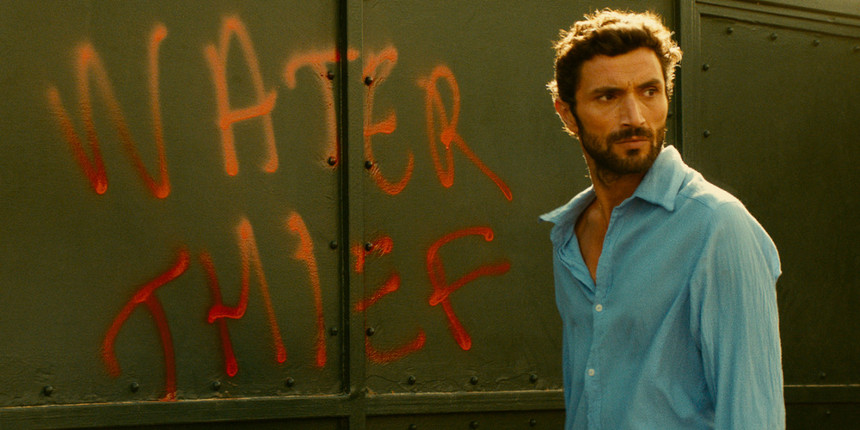Trieste 2016 Review: BLIND SUN, The Slow Burning of Madness

Joyce A. Nashawati's debut feature Blind Sun has been making the rounds of festivals for a year, so I was surprised to discover it had yet to be reviewed on Screen Anarchy. I was also quite pleased, as it was one of my favourite films of last year, and I welcome the opportunity for our readers to discover it. Set in the near future, exploring themes of isolation, immigration, xenophobia, paranoia, and environmental degradation, Blind Sun is an incredible impressive film, a nightmare thriller bordering on surrealism while telling its all-too-possible story through the eyes of a man on the brink of madness.
Set in the not-too-distant future, Ashraf (Zias Bakri) is in Greece to housesit for a French family while they briefly return to Paris. Greece is in the midst of a water crisis, with government controls on the use of the necessary liquid, and riots against a company that seeks to control the dwindling supply. A policeman, none too happy about an 'outsider' taking a job, confiscates Ashraf's residence permit during a routine stop. Left alone in the house, Ashraf must navigate the authorities, the family's strange neighbour Katarina (Mimi Denissi), the annoying cat, and those in the community who resent his presence, all the while suspecting that someone is sneaking into the house, attempting to drive him crazy, while the heat continues and even water might not cure the oncoming insanity.
Nashawati introduces the set-up for the story, and then lets it takes its course with little exposition all interference, which makes the tale all the more creepy and devastating. With her director of photography Giorgos Arvanitis, we are blinded (no pun intended) by this world; the searing hot sun turns everything shades of yellow, with bright oranges of fire to intensify this heat (I recommend having water on hand when you watch it), and only blue to occasionally quench the thirst, both literally and metaphorically. This is a world slowly drying up and burning out.
Greece is the perfect setting for this metaphor, given its worldwide status at the centre of the European austerity and refugee crises, and its roots in ancient mythology give the impression that this decline into chaos and desperation might have been inevitable. Indeed, the ancient world keeps popping up; in an archaeological dig that Ashraf encounters, the French woman (symbol of the modern, moneyed world) he meets at the dig, and the small sculpture of half of a woman's face, as if taunting him like the Sybil of Greek mythology.
A pet peeve of mine in film is when directors use voice-over to 'explain' the story (if you need that much voice over, you're not making a film). Thankfully, Nashawati gives just the right amount of information to get the audience into this world, and inside Ashraf's slowly fracturing mind. While this might seem to favour style over substance, in fact, the substance is given by a few choice shots of the landscape and/or characters, and a few choice words of dialogue that then allow the audience to see and hear as Ashrif does, to look through his perspective at this country in which he is seen as either an interloper, a servant, or a brief moment of enjoyment, and his isolation both emotionally and geographically.
Sound designer Frédéric Le Louet aids in creating the tricks on Ashraf's mind (if indeed they are tricks), as the one place of seeming safety, the villa, becomes the centre of Ashrif's undoing. Switching from fire to water, Nashawati creeps in the symbol to be just as dangerous as its outdoor counterpart, even though it keeps Ashraf alive. These devices, the visual and audio clues, are the story as much as the dialogue; it's a way of storytelling too often lost in an age of constant action and digital effects.
Nashawati strips down to its elements, essential cinematic storytelling, in a tale that will seem all too familiar and all too possible, with an equally all too possible and terrifying conclusion. Blind Sun is a remarkable debut, assured and detailed in its construction, fine-tuned to hit its mark with incredibly accuracy.
Blind Sun
Director(s)
- Joyce A. Nashawati
Writer(s)
- Joyce A. Nashawati
Cast
- Ziad Bakri
- Mimi Denissi
- Louis-Do de Lencquesaing
- Yannis Stankoglou







